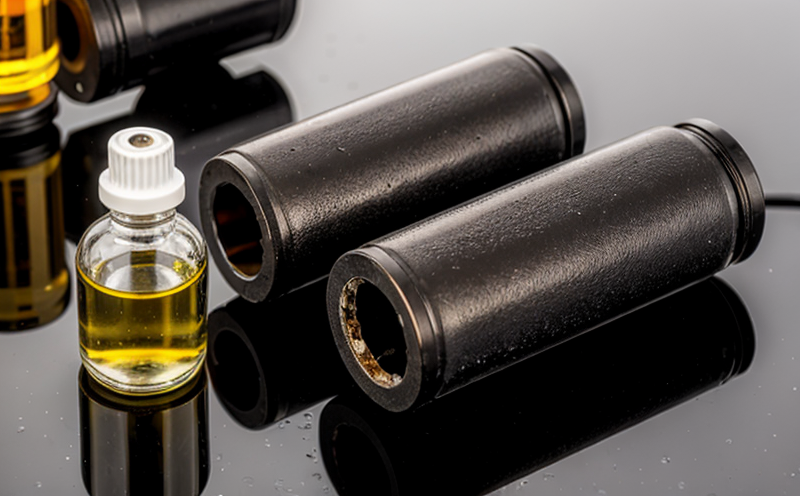ASTM D7678 Aromatic Hydrocarbons GC MS Test in Water
The ASTM D7678 method is a widely recognized standard for the determination of aromatic hydrocarbons present in water samples. This test, which utilizes gas chromatography-mass spectrometry (GC-MS), provides an accurate and reliable means to identify and quantify aromatic compounds in various types of water matrices.
The primary purpose of ASTM D7678 is to ensure that the quality of drinking water meets stringent safety standards. By detecting even trace amounts of aromatic hydrocarbons, this method helps prevent potential health risks associated with these compounds. The test is particularly useful for monitoring industrial discharges into public water systems and assessing compliance with environmental regulations.
The ASTM D7678 procedure involves several key steps to ensure accurate results. Initially, the water sample must be properly collected and preserved to avoid contamination or degradation of the aromatic hydrocarbons. Once collected, the samples are prepared by extracting the target compounds using a solvent such as dichloromethane. The extracts are then injected into the gas chromatograph (GC), which separates the different components based on their boiling points.
The separated components are subsequently introduced into the mass spectrometer (MS) where they are ionized and fragmented to produce characteristic ions. These ions are detected and quantified, allowing for precise identification and measurement of aromatic hydrocarbons present in the sample. The resulting data is then analyzed using software that compares the observed spectra against a library of known compounds.
One of the challenges associated with this test is ensuring minimal interference from other substances in the water matrix. This necessitates careful selection of extraction solvents and chromatographic conditions to optimize separation efficiency. Additionally, calibration standards are essential for accurate quantification, requiring regular verification against certified reference materials.
The accuracy and precision of ASTM D7678 make it an invaluable tool for quality managers responsible for maintaining water safety standards. Compliance officers can rely on this test to verify that their facilities meet regulatory requirements related to hydrocarbon contamination in wastewater discharges. For R&D engineers, the test provides valuable insights into potential sources of aromatic hydrocarbons and helps in developing mitigation strategies.
Water utilities also benefit significantly from ASTM D7678 as it enables them to monitor water quality continuously and respond promptly to any detected issues. Procurement teams can use this information to source raw materials or equipment that minimize the introduction of unwanted hydrocarbons into their systems.
Benefits
The benefits of conducting ASTM D7678 aromatic hydrocarbon GC-MS tests in water are numerous and far-reaching. Firstly, it offers a comprehensive approach to assessing the presence of aromatic hydrocarbons, ensuring that no critical component is overlooked during analysis.
Secondly, this method provides high sensitivity levels, allowing for the detection of extremely low concentrations of these compounds. This capability is crucial in maintaining stringent water quality standards and preventing any potential health hazards caused by excessive exposure to aromatic hydrocarbons.
A third benefit lies in its ability to pinpoint specific sources of contamination within a broader watershed or distribution network. By identifying precise locations where aromatic hydrocarbons originate, utility providers can implement targeted remediation efforts more effectively. This targeted approach not only enhances operational efficiency but also reduces overall costs associated with widespread treatment.
Moreover, ASTM D7678 supports regulatory compliance by offering consistent and reliable results across different laboratories performing the same test. This uniformity ensures that all stakeholders involved in water management receive accurate data upon which to base decisions. Compliance officers can thus rest assured knowing they are adhering strictly to legal mandates concerning hydrocarbon limits.
Lastly, the use of advanced technology like GC-MS allows for rapid turnaround times compared to older analytical methods. This efficiency is particularly important during emergency situations where quick action is necessary to address immediate threats posed by aromatic hydrocarbons in water supplies.
At Eurolab, we pride ourselves on offering unparalleled expertise and state-of-the-art facilities dedicated solely to ASTM D7678 testing. Our team of highly qualified professionals ensures that every sample processed adheres strictly to international standards, providing clients with accurate and reliable results.
We employ cutting-edge instrumentation equipped with the latest software applications designed specifically for GC-MS analysis. This investment guarantees consistent performance across all tests performed under ASTM D7678 protocols. Furthermore, our comprehensive quality control measures ensure that each result meets or exceeds industry expectations.
Our laboratories are accredited to perform this type of testing according to ISO/IEC 17025:2017 standards, ensuring compliance with recognized global benchmarks for laboratory excellence. This accreditation reflects our unwavering commitment to delivering top-tier services tailored precisely towards meeting client needs.
With Eurolab's experienced technicians and world-class equipment, we can confidently offer rapid turnaround times without compromising accuracy or precision. We understand the importance of timely results in preventing costly downtime or operational disruptions due to unexpected findings related to aromatic hydrocarbons in water supplies.
International Acceptance and Recognition
The ASTM D7678 method enjoys widespread acceptance and recognition among international bodies responsible for setting environmental and drinking water quality standards. Its adoption by numerous countries underscores its relevance and effectiveness in addressing global challenges associated with aromatic hydrocarbon contamination.
For instance, the European Union mandates compliance with EU directives related to surface waters and groundwaters, which often reference ASTM D7678 as a key analytical technique for assessing hydrocarbon levels. Similarly, organizations like the World Health Organization (WHO) and United Nations Environment Programme (UNEP) recommend this standard as part of their guidelines for ensuring safe drinking water supplies.
Within North America, both Canada and the United States have incorporated ASTM D7678 into their respective national codes governing wastewater treatment plants and municipal water systems. This integration reflects confidence in its robustness and reliability when evaluating compliance with regulatory requirements.
The growing trend towards sustainable practices further emphasizes the importance of accurate hydrocarbon analysis using ASTM D7678. As organizations strive to minimize their ecological footprints, they turn increasingly toward rigorous testing methods like this one to monitor progress and identify areas for improvement.





